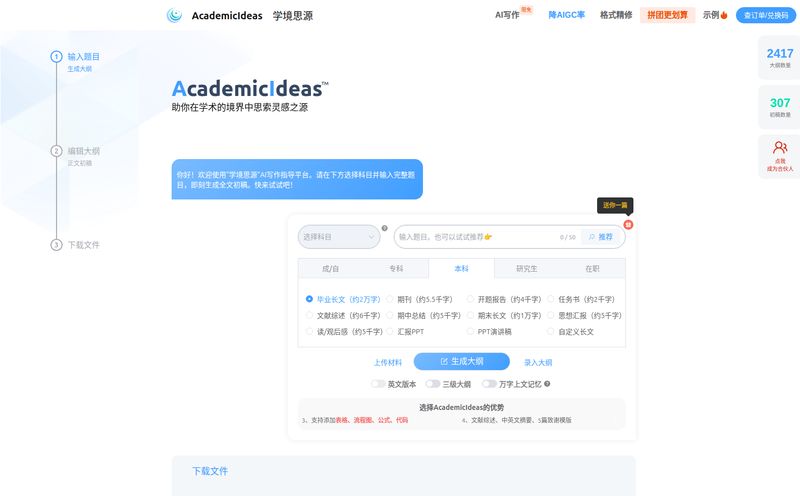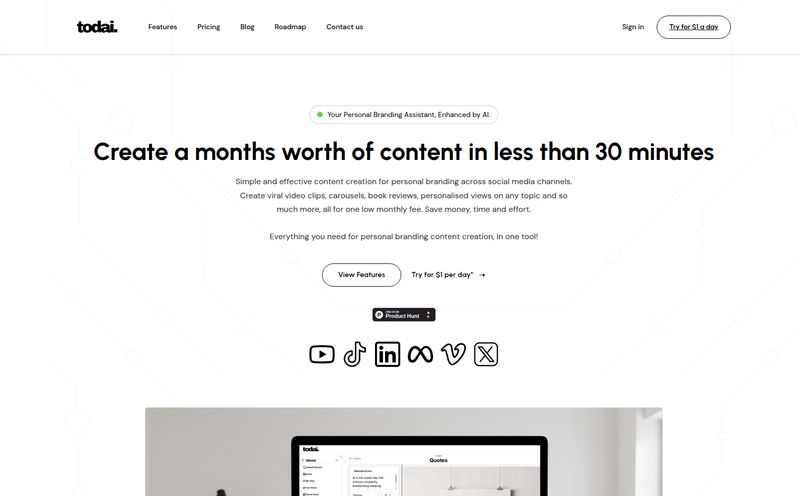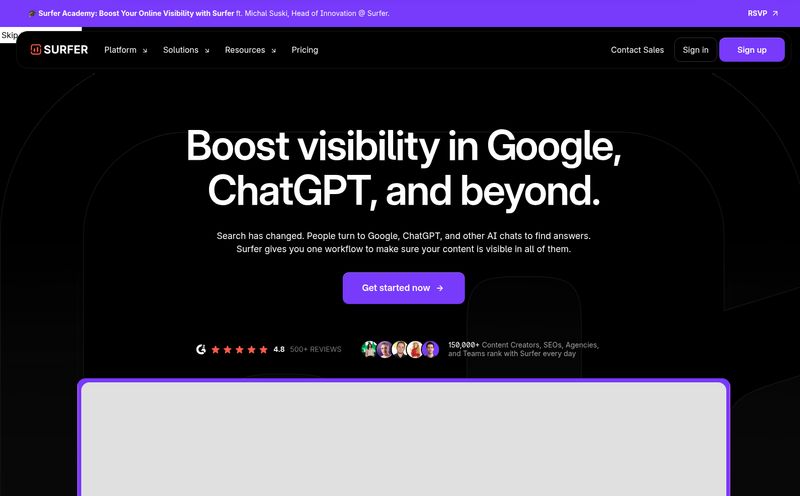Let’s have a real chat. The AI boom is… well, it’s booming. From our marketing tools to our CRMs, it feels like every piece of software we use suddenly has a brain. And as a guy who's been neck-deep in SEO and digital trends for more years than I care to admit, I've seen this movie before. New tech explodes, everyone rushes in, and then comes the slow, creeping question from our customers: “Wait a minute… can I trust this?”
We saw it with data privacy, which led to the GDPR and a thousand cookie banners. Now, we're seeing it with AI. People are getting a little nervous about how companies are using artificial intelligence. Are the decisions fair? Is the data safe? Are you secretly using AI to decide I should pay more for a plane ticket? It's a minefield of mistrust waiting to happen.
So when I stumbled across a tool called Ethicly.AI, my curiosity was definitely piqued. Their promise is simple and, honestly, pretty bold: they help you generate a free, customized Ethical AI Statement. A public declaration of how you’re using AI responsibly. Is it the real deal? Or just another piece of digital window dressing? Let's get into it.
First Off, What Even is an Ethical AI Statement?
Before we look at the tool, let's get on the same page. Think of an Ethical AI Statement like a Privacy Policy, but for your AI practices. It’s a document where you openly state your principles for developing and deploying AI. It answers questions like:
- How do you ensure your AI systems are fair and unbiased?
- What kind of data do you use to train your models?
- How much human oversight is involved?
- How do you handle accountability when an AI makes a mistake?
In a world where trust is the most valuable currency, having a clear answer to these questions isn’t just nice; it's becoming necessary. It’s a signpost to your customers, investors, and even your own team that you’re not just chasing the shiny new thing—you're thinking about its impact.
Introducing Ethicly.AI: Your AI Ethics Starter Kit
Alright, so what is Ethicly.AI? At its core, it’s a free-to-use platform that walks you through creating one of these statements. You don't need a law degree or a PhD in machine learning. It's designed to be a starting block, a way for any business, particularly smaller ones without a ten-person legal team, to get their thoughts in order and put something tangible on their website.
The platform provides the framework, you provide the specifics about your own business. Once you're done, you get a formal statement and even a neat little “Ethical AI” badge you can pop onto your site. It’s a simple concept, but in my experience, the simplest ideas are often the most effective.

Visit Ethicly.AI
A Look Under the Hood
While the homepage is pretty minimalist, the idea is straightforward. You sign up, and the platform guides you through a process to outline your AI principles. You can customize the details to reflect how your business actually uses AI, which is a big plus. This isn't a one-size-fits-all copy-paste job. You're meant to tailor it, to make it genuinely yours.
The goal is to produce a public-facing document that clearly communicates your commitment to responsible AI. It’s about turning the vague idea of “being good” into a concrete set of principles.
The Good, The Bad, and The Brutally Honest
No tool is perfect, right? Especially a free one. As an SEO and traffic guy, I'm always looking at things from a reputation and trust-signal perspective. Here's my breakdown.
The Upsides (And They're Pretty Significant)
I’ve gotta say, there’s a lot to like here. The most obvious benefit is that it's completely free. This removes the barrier to entry for startups and small businesses who are using AI tools but don't have the budget for expensive consultants. It democratizes the first step towards AI transparency.
Beyond the cost, creating a statement with a tool like this forces you to actually think about your AI usage. It can kickstart internal conversations that you probably should be having anyway. From a branding perspective, this is gold. Proactively publishing a statement enhances transparency and can seriously boost your brand's reputation. According to the 2024 Edelman Trust Barometer, business is the most trusted institution, and being transparent about technology is a huge part of maintaining that trust. This is a direct way to address that.
Finally, with regulations like the EU AI Act looming, having a documented policy is a smart move. It shows you’re ahead of the curve and taking your responsibilities seriously, even before you're forced to.
The Crucial Caveat: This is an Honor System
Okay, now for the dose of reality. As I was poking around the site, I zeroed in on the disclaimer. And you should too. It states, very clearly: “Each company is solely responsible for its own statements, and we do not audit or verify their accuracy.”
Let that sink in. Ethicly.AI gives you the template, but it does not check your work. It’s not a certification body. It’s not an auditor. It's a generator.
Think of it this way: Ethicly.AI helps you write a fantastic resume about your AI practices. It doesn't call your references to see if you actually are a “synergistic team player.” The responsibility for being truthful rests entirely on the company making the statement. This means a bad actor could, in theory, generate a wonderful-sounding statement that is complete fiction.
And that’s the big catch. The badge and the statement are only as valuable as the integrity of the company behind them. For me, thats not a dealbreaker, but it is a critical piece of context. It's a tool for honest companies to communicate their honesty. It's not a magic wand to create it.
So Who Is This Really For?
After weighing it all up, I have a pretty clear idea of who gets the most out of Ethicly.AI.
This tool is fantastic for:
- Startups and Small Businesses: If you're using third-party AI tools for marketing, customer service, or analytics, this is a perfect way to show you're being thoughtful about it without breaking the bank.
- Marketing Agencies & Freelancers: If you implement AI solutions for clients, having your own ethical statement can be a powerful differentiator. It shows you're not just a tech vendor; you're a strategic partner.
- Companies in Early Stages of AI Adoption: If you're just starting to build your own AI features, using this tool can provide a great internal framework to guide your development process.
Who should be cautious? Large enterprises or companies in high-risk sectors like finance or healthcare. For you, Ethicly.AI is a great starting point for internal discussion, but it is not a substitute for a comprehensive, legally-vetted compliance program. You'll need more than a generated statement; you'll need a robust, auditable governance structure. This tool isn't your destination, but it could be a useful signpost at the beginning of your road.
Making Your Statement Actually Matter
Creating the statement is step one. Making it work for you is step two. Don't just generate it and let it gather digital dust on some forgotten corner of your server. Put that statement in the footer of your website, right next to your Privacy Policy. Link to it from your "About Us" page. Mention it in sales proposals. When a customer asks about your AI, send them the link. Let your sales and support teams know it exists so they can use it as a resource.
The badge is a visual shortcut, but the statement itself is the proof. Use them together to build a consistent narrative of trust around your brand.
Frequently Asked Questions About Ethicly.AI
- Is Ethicly.AI really free?
- Yes, based on all the information available, the core service of generating an Ethical AI Statement is completely free. There's no pricing page, and "free" is a primary feature listed.
- Does using Ethicly.AI make my company legally compliant with AI laws?
- No. The site is very clear that it does not provide legal advice or act as a regulatory body. The statement is a transparency tool that can support your compliance efforts, but it is not a legal guarantee. You should always consult with a legal professional for compliance matters.
- What's the difference between an Ethical AI Statement and a Privacy Policy?
- A Privacy Policy primarily focuses on how you collect, store, and handle personal data. An Ethical AI Statement focuses on the principles guiding your use of artificial intelligence, including fairness, accountability, and transparency in decision-making, which might go beyond just personal data.
- Can I customize the statement from Ethicly.AI?
- Absolutely. Customization is a key feature. A generic statement wouldn't be very authentic, so the tool is designed for you to tailor the content to reflect your actual, specific AI practices.
- Does Ethicly.AI check if a company is telling the truth in its statement?
- No, and this is the most important thing to remember. Ethicly.AI does not audit or verify any of the claims made. It operates on an honor system, placing the responsibility for accuracy squarely on the company that creates the statement.
The Final Word on Ethicly.AI
So, what’s my final take? Ethicly.AI is a good thing. It’s a simple, accessible, and much-needed tool in a landscape that's getting more complex by the day. It’s not a magic bullet that solves the entire AI ethics dilemma, and we shouldnt pretend it is. Its power lies in its simplicity and accessibility.
It’s a conversation starter, both for the company using it and for their customers. It encourages transparency at a time when we need it most. As long as you understand what it is—a self-declaration tool, not a third-party certification—then I think it’s an incredibly valuable resource for any modern business. Give it a look. Thinking through the questions it asks is a worthwhile exercise in itself.



